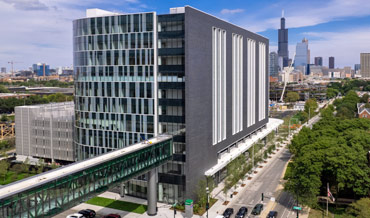High-Risk GI Cancer Clinic

Hours & Address
1725 W Harrison St
Suite 206
Chicago, IL 60612
About the High-Risk GI Cancer Clinic
Often people do not start having symptoms of gastrointestinal (GI) cancers until the cancer is more advanced. However, like most cancers, GI cancers are most treatable when detected at an earlier stage. Knowing your personal health history, family history and risk factors for developing GI cancer can help.
The high-risk gastrointestinal (GI) cancer clinic at Rush works closely with patients who have underlying pre-cancerous conditions or genetic factors that put them at a higher risk for developing GI cancers — including colorectal, esophageal, gastric or pancreatic cancers. Our expert team offers personalized GI cancer risk assessment, screening and preventive care.
We will work with you to provide individualized care and surveillance plans based on your distinct needs and risk factors.
Some of the services we offer include the following:
- GI cancer screening
- GI cancer risk assessment
- Therapeutic endoscopic services
- Genetic testing and counseling
- Pancreatic cancer screening
- Nutritional counseling
- Active surveillance
As one of the nation’s top-ranked academic health systems, Rush also offers access to clinical trials that focus on detecting GI cancers and chemoprevention therapies to prevent GI cancers from developing.
Is the High-Risk GI Clinic Right for You?
Our clinic is available to people and their family members who may have an increased risk for developing a GI cancer. We offer cancer risk assessment services to those who have any of the following risk factors:
- Multiple precancerous gastrointestinal polyps, including serrated polyps
- Precancerous GI polyps detected at a young age
- Early-onset colorectal cancer
- Any GI cancer in the presence of an additional primary cancer
- Family history of a GI cancer at a young age
- Family history of pancreatic cancer in two or more first-degree relatives
- Gastric intestinal metaplasia or family history of gastric cancer
- A personal or family history of GI cancer or any of these inherited genetic syndromes:
- Lynch syndrome (formerly HNPCC or Hereditary Non-Polyposis Colorectal Cancer)
- Familial adenomatous polyposis (FAP)
- MUTYH-associated polyposis
- Peutz-Jeghers syndrome
- Juvenile polyposis syndrome
- Cowden’s syndrome
Rush University Medical Center Ranked Among the Best in the U.S.
Learn More







